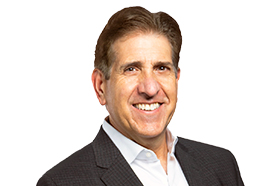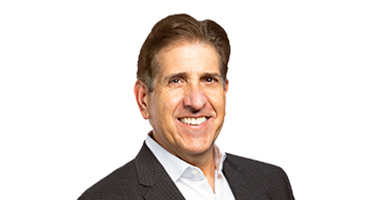AI could cause more disruption for big companies
One of the “conventional wisdoms” of journalism is to make sure you’re covering the news instead of creating it. That’s been a tough maxim to follow lately, as media outlets and the news industry have been a central focus of national news coverage. The changing news ecosystem, the potential disruption of AI, the legal troubles of Fox News and the business troubles of CNN all have dominated coverage of current events. Clearly, “the news” is itself making news these days.
To examine these news issues in more depth, Grant Thornton hosted a forum in April moderated by its U.S. Media & Entertainment Senior Advisor, Howard Homonoff, and featuring three panelists: NBCUniversal CFO Anand Kini, Axios Media Reporter and CNN Contributor Sara Fischer, and Sunil Kapadia, Google’s Managing Director of Strategy & Operations and Global News Partnerships. Below are excerpts of that discussion.
Current state of the news business
HOWARD HOMONOFF: So, Anand, I'm going to start with you. Anand Kini is the Chief Financial Officer and Head of Strategy for NBC Universal. And you know your lens, at least in part, is as the chief financial officer for amongst the most iconic brand names in the world of news and information, right, not just in the country but in the world. How are you seeing the business of news today from your perch?
ANAND KINI: You know that movie “Everything Everywhere, All at Once”? To me, that probably encapsulates what I think of news. On one hand, the demand for news is at unprecedented levels that we've never seen before. At the same time, the business model is maybe as uncertain as it's ever been.
HOWARD HOMONOFF: It's a good analogy. Sara Fischer—many of you, I suspect, are readers of hers, or viewers—is a Senior Media Reporter for Axios, and as well covers the media business as a contributor at CNN. What is the view from your perch about the where the business is today?
SARA FISCHER: Thank you. That's a great question and thank you so much to GT for having me. When we launched Axios in 2017, we did a lot of things differently so that people could consume news in a mobile native experience.
We decided that we were going to write shorter but with authority. Meaning, hire the foremost experts in a particular subject matter, whether that's deals, energy, biotech, etc., and they can write short. We feel like we're in a good spot.
HOWARD HOMONOFF: Sunil is one of the leaders in new global news partnerships at a small startup called Google, which is in and of itself a giant digital publisher. But your job is being the linchpin with news publishers, all over the world. What are you seeing in your role and among your partners?
SUNIL KAPADIA: First of all, it's great to be here with you, Howard, with both of you and with the audience. When you think about news partnerships at Google, that encompasses a broad range of different types of publishers. From large national brands all the way down to community papers and everything in between. And that's global.
One thing that stands out to me is there's a big bifurcation, I think, happening in the news business where, in almost every market, there's a handful of very powerful, very well-known, very reputable national brands that are taking a lot of share. Whereas in the rest of the ecosystem, I think, reader revenue has been down consistently over a long period of time. There's a real open question around what that business model of the future is going to be.
The challenge of AI
HOWARD HOMONOFF: When we talk globally, are you seeing things that work very differently in different markets? Are there any kind of commonalities?
SUNIL KAPADIA: I think AI is a wide-open question. It is going to affect, I think, every part of the business from the newsroom.
HOWARD HOMONOFF: So since you raised the devil of AI, let me ask you, Anand, how are you beginning to think about it?
ANAND KINI: We’re not rushing headlong into AI from an editorial or journalistic perspective.
One of my colleagues just said, let's be careful: AI can be another word for plagiarism.
HOWARD HOMONOFF: Sara, how are you in terms of AI? What are you seeing as a reporter and in terms of Axios and the way it approaches its business?
SARA FISCHER: So, I've been to a bunch of publisher meetings, off-the-record meetings, where the top CEO's, publishers, presidents of every major news organization has come together and said, “What do we do?” Copyright law right now only protects human works. So if we are to start integrating automation into our content, we need to ensure that our IP is still protected because a lot of media companies license that IP.
The second thing we're thinking about is can we be fairly compensated for our works being leveraged to train the algorithms that are being used in Google’s Bard or open AI?. The platforms absolutely need our content to train their algorithms to put out authoritative factual information, and we need money.
In terms of implementation, there's also a collective understanding or amongst most media organizations that AI can be very useful at this time for optimizing operations. I think, we feel comfortable bringing AI into the workflow to make us more efficient, to save money, so that we can use that money saved to benefit the journalism.
In terms of AI, on the editorial side, as I said, we're moving cautiously.
I think folks were trying to experiment with it. at Axios, we created a separate division of our company that's a software platform called Axios HQ. When we sold to Cox, we spun that division out. So now it's an independent company that just raised its own money. That platform helps companies write e-mail newsletters the way that we do on our editorial side. That is very AI-driven. That is a tool that we are licensing out to different brands, and we use AI to help make their headlines stronger to help make their body copy stronger.
You know, this is not journalistic work that companies are using it for, so it doesn't need the same level of copyright protection. They're mostly using this software to write internal HR emails.
Trouble for Fox News, CNN
HOWARD HOMONOFF: Sara, maybe share a little bit of the color surrounding the Dominion lawsuit against Fox News about your thinking about the impact.
SARA FISCHER: So, I was in Delaware at a Superior Court. I was in the courtroom when the judge said both parties have resolved their dispute.
Leading up to this trial, there are a lot of pre-trial rulings that made it clear Fox was going to face an uphill battle. And so, there was this culmination of factors that led Fox to lean towards a settlement. I think Fox did not know how bad the pretrial rulings would be. They didn't know how bad discovery would be. There were a few other factors—the jury selection. So, Fox has an incentive to settle.
Dominion is an interesting one. They’re owned by a private equity company. And you know, they have been saying this whole time that they wanted to make a point … that you can't get away with defaming and lying and meddling with truth and democracy. But the settlement was $787 million to Dominion—which, by the way, Dominion is valued at like $100 million—so it's a huge financial win for Dominion and Dominion’s private equity owners.
I think Dominion did the right thing by taking the money. I think for people who want to see an on-air apology from Fox, you know, that's a shame that they're not going to get that.
But this is still damaging for Fox, in part, because they have now set a new precedent that for all other defamation lawsuits that they face, including an even bigger one from Smartmatic, another voting machines company, that they have to settle.
HOWARD HOMONOFF: Within NBC, how do you view what has happened in the Fox-Dominion case, not just the settlement, but the base itself? Has it had much of an impact for you?
ANAND KINI: We’re a business. We're a part of a public company. That being said, I don't think we view the balance between making money and other objectives the same in every business. And I think we recognize news has some other objectives as well.
I think we've always been very proud and we take very seriously that balance that we have to have. We do care about making money. But I don't think we ever use money as a way to guide our editorial policy.
HOWARD HOMONOFF: Anand, NBC has made a visible investment in streaming with NBC News Now. Can you talk about the future health and how you're thinking about local broadcast, national broadcast and cable and where streaming fits into that from a platform perspective?
ANAND KINI: It's funny. We almost don't even think of it in those terms. And I think if you asked me that 20 years ago, we would have. We've evolved. Where for us, we're about news. Obviously, the news will be tailored for, sometimes, the platforms in which it's in. We had a very successful show on Snapchat, Stay Tuned, which is tailored for the Snapchat audience, which is not going to sit through a 22-minute news block. It's going to be snappy and it's going to have a different type of journalist delivering it.
That being said, in our world, we think—there's news, there's opinion news, there is kind of general news, and then we tailor to news for the platform. So, there will be something for MSNBC which will fit a traditional schedule. There will be something then for NBC News Now, which may have the same kind of block in terms of how it is structured, but we have a different journalistic lens to it given the audience that is there, and obviously something different for TikTok, different for Snapchat.
So, our world is not, “Well, what are we going to do with broadcast versus cable?” It's more about how are we going to make sure we get our news product out to as many different audiences that we can? And then also, how do you develop business models recognizing the business models for each one of those is going to be bespoke.
The business model for cable is a subscription fee and ad sales, great model, no question. We have news on Peacock, which is going to be a sub fee plus ad sales. And we have news on NBC News now which is pure ad sales.
HOWARD HOMONOFF: Sara, you are, in addition to your Axios hat, you wear a CNN hat. Given the two platforms that you serve—how are you seeing the world from within CNN and in covering the world that they operate in?
SARA FISCHER: So, I think the biggest problem that CNN faces is that they have one of the most highly trafficked news websites in the world, but they do not monetize it to the extent that they need to. They are clearly trying to figure out what comes next after the fall of linear television.
And prior to the merger with Warner Brothers Discovery, they were going to launch a subscription streaming service called CNN Plus and that got killed because the numbers just didn't work out.
And so, the next question for CNN is what comes next. I think broadly speaking, the existential challenge of CNN faced was during the Trump administration. And it wasn't just CNN, a bunch of different outlets try to figure out how do you hold power to account while also not alienating people who respected that power (Note: After this discussion, Chris Licht, chief executive and chairman of CNN, was relieved of his duties June 7 by CNN’s parent company, Warner Bros. Discovery).
And the new ownership at CNN is trying to figure out, “How do we do that in a way that doesn't isolate half the country?” They’re leaning much more heavily into their news reporters.
Hopefully they can take that transformation and make a really strong business case for it. But I think it's going to take a little bit of time and I think they're also looking at the folks like NBC Universal, and maybe they can borrow a page one day from NBC News Now and think about something that's ad-supported. Or maybe they can borrow a page from Axios and think about how to better monetize their digital product.
HOWARD HOMONOFF: I want to give other folks a chance to participate here.
Audience member: My question about AI is, is there a concern that at some point, someone might, use AI to make a news outlet that would cannibalize traditional news outlets?
SUNIL KAPADIA: I can take that. I think there's still a lot to figure out with Chat or AI, and the most important thing is that chat bots hallucinate and they make up things that aren't exactly right. And that's true of all of them. And it's a problem that's not figured out yet. And so, the way that most chat bots are dealing with that now is, you know, a step called grounding, where they actually go check the Internet for factual information.
So, I think the way that we are thinking about it more is, “How is it an aid to traditional news outlets?” not “How is it a replacement to traditional news outlets?”
HOWARD HOMONOFF: Sunil, what are some of the most interesting innovations you’ve seen in the news business globally?
SUNIL KAPADIA: I would love to hear everyone's perspective on this. One of the partners that we work with a lot is a Canadian chain, Village Media, and one of the things that they've done is gotten very, very good at deciding what markets to create the news for, and then what kind of structure to create the news in, and then how to monetize it.
So, what I mean by that is, they're deliberate about picking small- to medium-sized cities where there's already a habit of people consuming the news, so they're not having to recreate it. They don't want to go bigger than small or medium, because if they do that the news that they produce isn't relevant to everyone. They tend to like cities where there's a population that's been there for a long time, where there's an older population that values news, and so they're very deliberate about getting to an audience that cares.
I think what I'm getting at is being very clear on audience and what's going to resonate and be monetizable against that audience, which I think is a lot of this transformation that we're seeing is not being able to match those two things up efficiently. And I think it's going to take a while for the industry to sort that out.
ANAND KINI: Yeah, I think the only thing I would add, and I totally agree with what Sunil said, in general, I think you had mentioned, earlier too, in this era of fragmentation, I think there's definitely a flight to quality and frankly, it's not just in news. I mean, if I wear my other hat, it's an entertainment, too. And so, there's tons and tons of choices and there is fragmentation. But at the end of the day, there's still those things that everybody's watching Succession. It kind of stands out above a lot of other stuff.
And you're seeing the same things in news. Now granted, it's a little bit of a biased answer because we have a big brand and we take pride in that, “Hey, we're one of the pre-eminent news companies.” But I do think, and to give Axios a lot of credit, in a quick time, you've become a pre-eminent news company. Unfortunately, there's some folks that aren't making that cut.
SARA FISCHER: I completely agree with Anand just said, and to add to it, I'd say you have to go in knowing that, in particular, some of these short-form video platforms, the Snaps, the TikToks (really, the TikToks), you're not going to make the same type of profit margin that you did in traditional television. So, you need to budget for potential short-term loss to develop trust and audience with that generation. You have to hope that you will have developed a strong enough audience so that once monetization is introduced, you can reap the benefits.
But in the short term, you may have to sacrifice a little bit of profit by putting together teams—like Stay Tuned is a completely separate team of people, separate anchors—to invest in this product and you can't get upset that it's not going to make a bajillion dollars off the bat the way that your linear cable product does.
HOWARD HOMONOFF: So we're unfortunately out of time. But before we close, I'm going to ask each of you quickly to give me one thing that that gets you most excited about the future of the news business?
SUNIL KAPADIA: I think that accessibility to news is just higher than it's ever been, and I think what that means is that there is an opportunity for a lot more different voices to connect with audiences and, like, provide the news through different lenses and more resonant lenses. And that excites me.
HOWARD HOMONOFF:
Sara?
SARA FISCHER: I cover press freedom issues and around the world it can be pretty dire. One of our fellow Americans, Evan Gershkovich, is currently being detained in Russia. The thing that gives me hope and optimism is despite a lot of the challenges that our business faces, the profession continues to be very highly protected in the U.S. You don't hear about journalists here being detained and jailed. The press freedom ecosystem has never been healthier here in the U.S., and that makes me excited.
ANAND KINI: I think what makes me hopeful—again, I'm going to put like a pure kind of “business finance lens” on it—If you look at it very broadly, what's kind of very interesting to me is, true stories, which is what news is all about reporting, what is happening around us, look how popular it’s being. To me, as long as you have this kind of insatiable consumer interest in understanding of the world around us, and I think we've seen that, the future of news is great. And I think it's better for us as a world.
We don't always see it every day, but I think long-term more and more information being available on more platforms, we have a lot of work to do to make sure it's the right information.
About the panelists
Anand Kini is the chief financial officer for NBCUniversal
Sara Fischer is a media reporter for Axios and an on-air contributor for CNN
Sunil Kapadia is the managing director of Strategy & Operations and Global News Partnerships for Google
Contacts:



Senior U.S. Media & Entertainment Industry Advisor
Grant Thornton Advisors LLC
Howard Homonoff serves as Senior U.S. Media & Entertainment Industry Advisor for GT. Howard has been a leading executive, lawyer and strategic advisor in the media business for over 20 years.
New York, New York
Industries
- Media & Entertainment



Head of Media & Entertainment Industry
Grant Thornton Advisors LLC
Deborah Newman is the Head of the Media & Entertainment industry based in the Los Angeles office.
Los Angeles, California
Industries
- Technology, Media & Telecommunications
- Media & Entertainment
Trending topics

No Results Found. Please search again using different keywords and/or filters.
Share with your network
Share